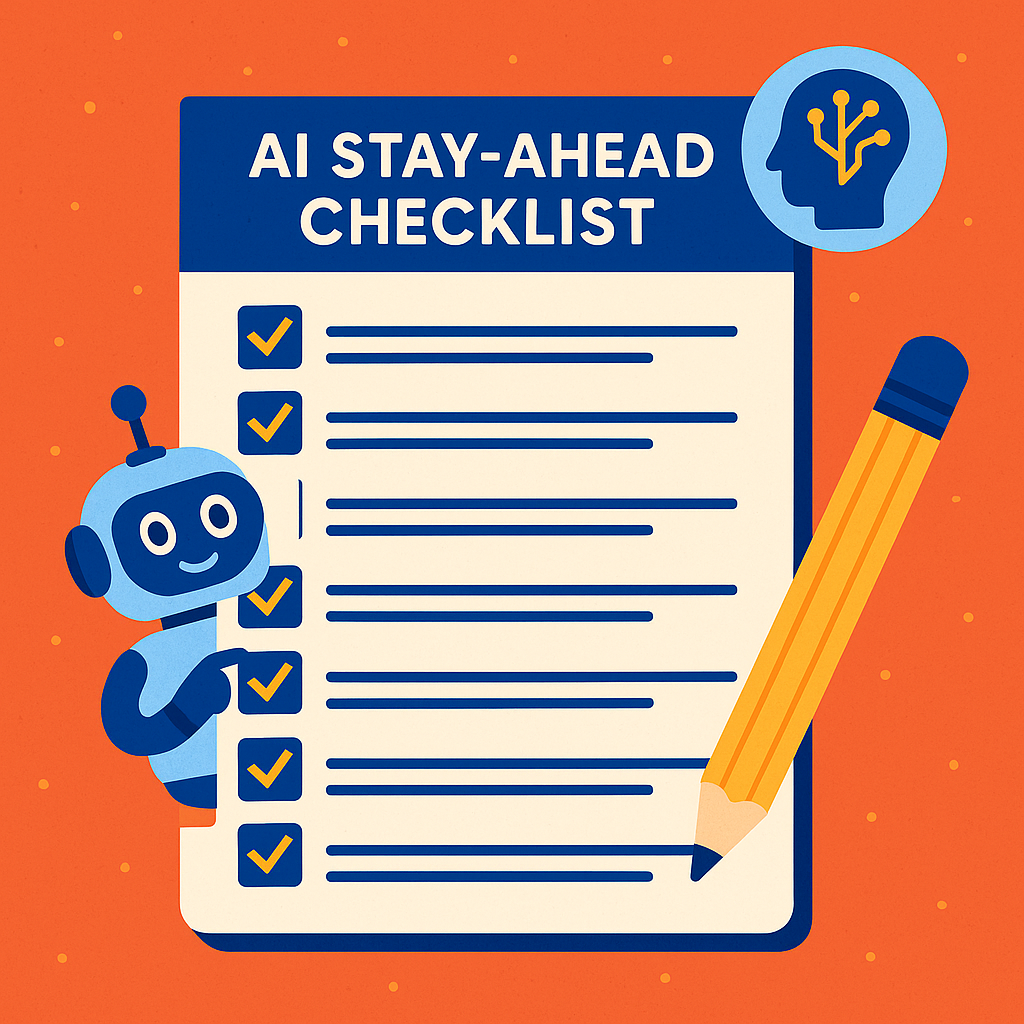The pace of change in AI is wild — and if you’re a digital marketer, it’s easy to feel like you’re always behind.
One minute you’re learning how ChatGPT can write a sales page. The next, someone’s using AI to generate a full marketing funnel, edit video, run split-tests, and write 30 tweets in 60 seconds.
Here’s the truth: you don’t need to learn every tool. You don’t need to chase every trend. What you do need is a consistent system that keeps you sharp, agile, and one step ahead — without burning you out.
That’s where this AI Stay-Ahead Checklist comes in.
This isn’t about more tools. It’s about smarter habits.
Why You Need a Weekly AI Habit — Not a Monthly Panic
If you wait until you’re behind to “catch up on AI,” you’ve already lost time, clarity, and momentum.
But if you spend just 30–60 minutes per week on a few focused actions — auditing your tools, testing one new thing, reviewing your prompts — you’ll consistently stay ahead of 90% of marketers still stuck in reaction mode.
This checklist gives you 10 simple habits. Start by picking 3–5 each week. You’ll build skills, sharpen systems, and find AI wins that actually matter to your business.
✅ The 10-Point Weekly AI Checklist for Smart Marketers
1. Review Your Current AI Stack
- Are you using the tools you signed up for?
- Cut the dead weight. Revisit your subscriptions.
- Ask: “What problem am I solving with this?”
Pro Tip: Focus on 1–2 tools that save you time or make you money.
2. Save and Organize Your Best Prompts
You probably found a great ChatGPT prompt last week. Did you save it? Document it? Could you find it again?
Set up a simple prompt library using:
- Google Docs
- Notion
- Trello
Bonus: Categorize prompts by task: content, copy, email, product ideas, etc.
3. Skim Two Quality AI Newsletters
No need to scroll Twitter for updates. Instead:
- Read Ben’s Bites or The Rundown AI
- Screenshot or copy one tip or tool to test later
This keeps your input clean and curated.
4. Run One Micro Test Using AI
Pick one task in your business this week — and ask:
“Could AI do this faster, or better?”
Examples:
- Rewrite an email subject line
- Draft a lead magnet outline
- Summarize a customer review
Rule of Thumb: Try. Then edit. Then save what works.
5. Use AI to Learn AI
This is an underrated move. AI tools like ChatGPT are great teachers.
Ask it to explain:
- “What’s Claude vs ChatGPT vs Gemini?”
- “How can I use AI to grow my email list?”
- “Give me 5 AI tools that help with lead generation”
Fast, low-pressure, and totally personalized.
6. Analyze One Funnel or Asset with AI
Feed your copy, funnel flow, or offer into an AI tool and ask:
“What would you improve to increase conversions?”
You’ll get angles you didn’t think of — instantly.
7. Save One Win to Your AI Playbook
Did a prompt work well?
Did you improve a metric?
Did AI help you publish faster?
Save that into your personal AI system. Over time, it becomes your unfair advantage.
8. Share One Lesson With Your Audience
This could be:
- A short tip on LinkedIn
- A tweet thread
- A quick email to your list
Teaching what you’re testing builds authority — and reinforces your learning.
9. Evaluate One Use Case You Haven’t Tried Yet
Ask:
“What am I still doing manually that’s repetitive or slow?”
Examples:
- Transcribing videos
- Writing product descriptions
- Generating blog outlines
List it. Look it up. Try it next week.
10. Block 30 Minutes for AI Work Each Week
Treat this like a meeting with your future self. You’re not reacting — you’re evolving.
Use it to:
- Test one prompt
- Update your library
- Study a new tool
- Document your workflows
You’ll feel ahead, not just busy.
Final Takeaway: AI Isn’t a One-Time Learning Curve — It’s a Weekly Advantage
The people getting real results from AI right now?
They’re not obsessed with tools.
They’re obsessed with outcomes.
They build habits, test consistently, and move quickly.
So instead of asking:
“What’s the newest AI trend?”
Ask:
“What’s the one small thing I can improve with AI this week?”
Print this checklist. Save it. Use it weekly.
You’ll be stunned at how fast you grow — and how little time it takes to stay ahead.



